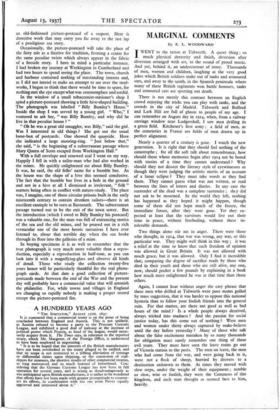MARGINAL COMMENTS
By E. L. WOODWARD
IWENT to the tattoo at Tidworth. A queer thing ; so 1. much physical dexterity and finish, diversion after diversion arranged with art, to the sound of proud music. And yet, behind it, an undercurrent of irony. Thousands of men, women and children, laughing at the very good jokes which British soldiers make out of tanks and armoured cars, and away to the south, in the Spanish peninsula where many of these British regiments won battle honours, tanks and armoured cars are spurting out death.
There is not merely this contrast between an English crowd enjoying the tricks you can play with tanks, and the crowds in the city of Madrid. Tidworth and Bulford and Lark Hill are full of ghosts to people of my age. I can remember an August day in 1914, when, from a railway carriage window near Ludgershall, I saw men drilling in a green field. Kitchener's first army ; a field of men, as the cemeteries in France are fields of men drawn up in perfect alignment.
Nearly a quarter of a century is gone. I watch the new generation. It is right that they should feel nothing of the catastrophe ; for all the soft talk about remembrance, how should those whose memories begin after 1914 not be bored with stories of a time they cannot understand ? Why should they not dissect the literary style of eyewitnesses as though they were judging the artistic merits of an account of a lunar eclipse ? They must take words as they find them. They cannot guess what was not written, or read between the lines of letters and diaries. In any case the surrender of the dead was a complete surrender ; they did not ask to be mourned. In the world they left, nothing has happened as they hoped it might happen, though some of them did not hope much of the future, the immediate future, after they were gone. Yet they ex- pected at least that the survivors would live out their time in peace, without foreboding, without these in- tolerable demands.
Two things alone stir me to anger. There were those who thought, in 1914, that war was wrong, any war, or this particular war. They might well think in this way ; it was a relief at the time to know that such freedom of opinion was allowed in Great Britain. It was not allowed with much grace, but it was allowed. Only I find it incredible that, comparing the degree of sacrifice made by those who died in their youth and those who are still alive, any one, now, should pocket a few pounds by explaining in a book how much more enlightened he was at that time than those others.
Again, I cannot hear without anger the easy phrase that these men who drilled at Tidworth were poor mutes gulled by mass suggestion, that it was harder to oppose this national hysteria than to follow your foolish friends into the general ruin. For that matter, are there not good as well as bad hours of the mind ? Is a whole people always deceived, always tricked into madness ? And the passion for social justice today, has this come out of nothing ? Were men and women under thirty always captured by make-believe until the day before yesterday ? Many of those who talk about the false excitement mistaken by so many thousands for obligation must surely remember one thing of these evil years. They must have seen the leave trains go out of Victoria station to the ports. The men on leave, the men who had come from the war, and were going back to it, were not a flock of sheep, hurried by drovers to a destination unknown to them. At times they moved with slow steps, under the weight of their equipment ; nimble or slow, wise or foolish, they were the Commons of this kingdom, and each man thought as seemed best to him, heavily.






































 Previous page
Previous page